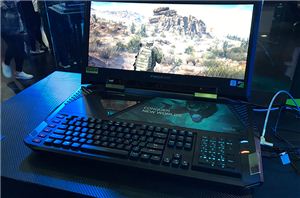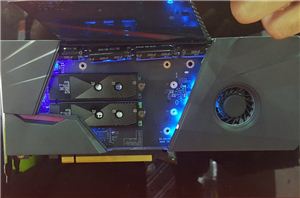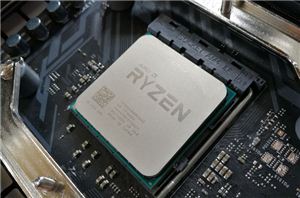A USB Stick as an SSD? A New Silicon Motion SM3282 Single-Chip Controller for USB SSDs
by Anton Shilov on May 31, 2019 3:00 PM EST- Posted in
- SSDs
- Storage
- Silicon Motion
- 3D NAND
- External SSDs
- Computex 2019
- SM3282

Silicon Motion has introduced its first single-chip controller for portable USB SSDs. The SM3282 promises to enable makers of portable drives to offer up to 400 MB/s sequential read speeds in a cost-efficient manner previously unachievable by external SSDs.
Silicon Motion’s SM3282 chip packs a USB 3.0 (aka USB 3.2 Gen 1) controller alongside an SSD controller featuring 2 NAND channels with 4 CE (Chip Enables) per channel, integrated 3.3V/2.5V/1.8V/1.2V voltage regulators, and other necessary things. The chip comes in a 68-pin QFN package and supports the latest types of 3D NAND memory (including 3D TLC and 3D QLC memory featuring up to 96 layers) from all leading suppliers of flash. It also supports both USB Type-A as well as USB Type-C connectors.
Previously, makers of external SSDs had to use a USB-to-PCIe bridge alongside an SSD controller to build their products, which greatly increased BOM costs as well as the final price. The SM3282 packs all the necessary functionality into a single chip and thus reduces BOM cost of external SSDs.
As far as performance is concerned, the SM3282 can enable external SSDs featuring up to 400 MB/s sequential read and write speeds. Meanwhile, producers of actual SSDs tend to use different types of memory with different interface speeds, so performance of actual devices will vary.
This week Silicon Motion is demonstrating prototype external SSDs based on the SM3282 at Computex. Expect commercial drives powered by the controller to be available in the coming quarters at a variety of price bands.
| Want to keep up to date with all of our Computex 2019 Coverage? | ||||||
 Laptops |
 Hardware |
 Chips |
||||
| Follow AnandTech's breaking news here! | ||||||















46 Comments
View All Comments
mdrejhon - Friday, May 31, 2019 - link
What we really want to know is the IOPS on this baby.... Whether we can spray 1000 tiny files into a thumbdrive folder in just 2 seconds.name99 - Friday, May 31, 2019 - link
They can’t really control that, if the controller is hooked up to crappy flash.But they CAN control if the controller supports SMART and TRIM... It’s a pity the article doesn’t mention that.
Samus - Saturday, June 1, 2019 - link
True, I wonder what protocol it’s using, hopefully UASPValantar - Saturday, June 1, 2019 - link
Even cheapo AliExpress USB-to-SATA adapters support UASP, so it would be a travesty if this didn't.Icehawk - Monday, June 3, 2019 - link
Last pic shows “supports UASP mode”hojnikb - Sunday, June 2, 2019 - link
yes they can. Random performance is almost always limited by the controller, not flash, at least with deeper queue depths. You can have crappy flash still perform decently if its paired with good enough controller.Duncan Macdonald - Friday, May 31, 2019 - link
For writes it will largely depend on how much RAM is in the controller chip, unless there is several megabytes then the write IOPS will be low. Your best bet is to transfer the tiny files into a ZIP file on the host computer and transfer that to the USB SSD.hojnikb - Sunday, June 2, 2019 - link
not just ram. Random performance is heavily dependent on cpu controller uses as well. Most cheap usb controllers use 8 bit 8051 style cpus which suck at that.Santoval - Saturday, June 1, 2019 - link
As a general rule, with some very rare exceptions* whenever a manufacturer does not list or does not disclose a spec their product sucks at that spec. Manufacturers do not want their products to look bad. Hence you performance scenario looks highly unlikely.*These exceptions always involve some "surprise aspect", meaning that the product performs surprisingly well on that spec and the manufacturer does not want to disclose that early, as a way to "tease" and startle their customers in a positive way. I *strongly* doubt this is the case here.
Azethoth - Sunday, June 2, 2019 - link
They said sequential 400 for R&W. The integrated hardware so far are all prototypes. Random I/O would obviously be lower.Your comment is premature and also ignorant. I am waiting to see and I expect it to be a straightforward scale down from the 400/400 max they list. You know, just like for any other SSD ever.